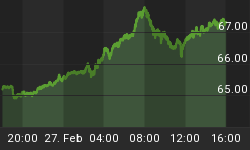I hope the Census Bureau can count the number of people in the U.S. better than it can count the number of new homes sold. The first estimate of a given month's sales is notoriously off. So, we should take the first estimate of May sales and inventories of new homes with a grain of salt. Be that as it may, May new home sales retreated 2.5% to an annualized pace of 512 thousand units. The low sales rate for this cycle to date is 501 thousand established in March. The sales region that really put a dent in the total was the wild West, where sales declined 11.63% to a cycle low annual rate.
But I want to concentrate on the difficulty developers are having in moving their "merchandise" and what the supply looks like relative to demand. Chart 1 shows that it took a record high 8.5 months for builders to sell a home after it was completed. Also chart 1 shows that the months' supply of completed homes at the May sales rate was a record 10.1. The bottom line is that that the bottom in the housing market and house prices is nowhere in sight.
Chart 1
The Nondefense Market for Durable Goods - The Big Picture
Chart 2 shows that in May, shipments of durable goods excluding defense were down year-over-year 4.4%; new orders for the same were down 4.3%. Both started to soften in late 2006 when the tentacles of the housing recession began squeezing other sectors of the economy. The housing recession is taking its toll on the demand for discretionary consumer goods, which is reflected in the contraction in durable goods activity. This year, there has been a bit of a rebound in shipments and new orders for nondefense capital goods excluding aircraft (see Chart 3). Relatively strong export demand probably is playing a role here. This export demand is likely to allow the U.S. manufacturing sector to escape the degree of contraction it often suffers in recession. If, however, the manufacturing surveys reported by the New York Fed's Buffalo branch, the Philly Fed and the Richmond Fed are any guide, June durable goods orders and shipments data could be quite weak.
Chart 2
Chart 3
The Norwegian Krone as the Next Reserve Currency?
Today, the Norges Bank, the Norwegian central bank, raised its policy interest rate 25 basis points to 5.75%. That puts the Norges Bank's policy rate 293 basis points over the May year-over-year CPI inflation rate on a harmonized basis (see Chart 4). Notice that the Norges Bank was raising its policy rate in the first half of 2007 as the inflation rate was falling. The Norges Bank is offering savers an "honest" return on their funds. Isn't this what you would look for in a reserve currency's central bank?
Chart 4
FOMC Stays on Hold, Keeping Its Options Open
The Fed is less worried about a death spiral in real economic activity and more worried about upside risks on inflation than it was at the end of April. This does not mean that the economic downside risks and inflation upside risks are equal in the eyes of the FOMC. In my opinion, the Fed remains more worried about weaker economic activity than it is about a wage-price spiral. Recent data suggest that housing is nowhere near a bottom, capital spending remains weak and the labor markets continue to soften. The next element of aggregate demand to cave in will be state/local government spending. The jury still is out as to whether consumer spending is out of the woods. The motor vehicle producers would say "no." Meanwhile, industrial metals prices appear to have topped out, crude oil prices have edged lower, and one of the Fed's favorite market-based measures of inflation expectations - the implied 5-year inflations expectations 5 years forward - has fallen back in range (see Chart 5). My bet is that the FOMC remains on hold for the rest of the year as consumer spending softens again and headline inflation moderates in the third quarter.
Chart 5















